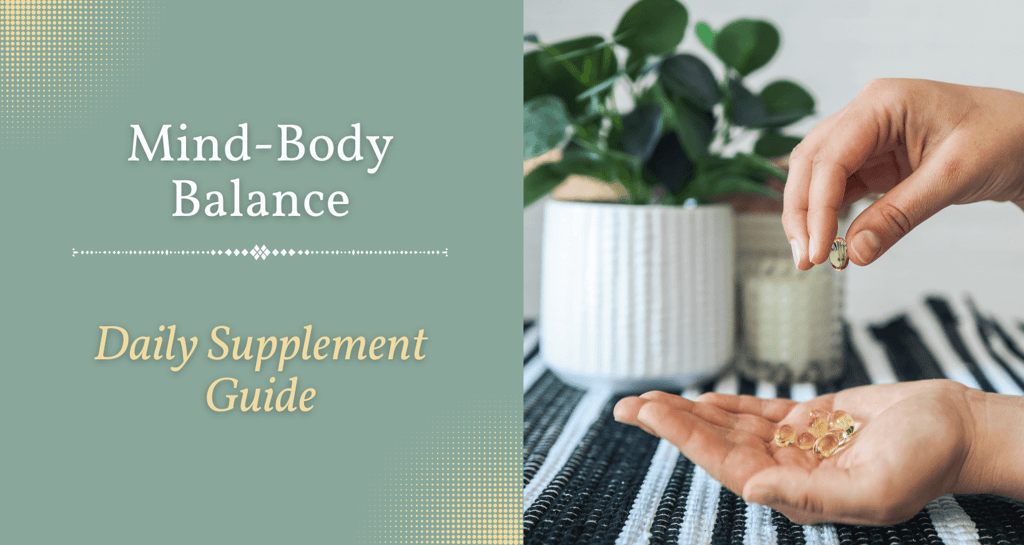Add your promotional text...
Discover The Perfect Mind-Body Balance: What Supplements Should You Take Daily
8/30/20233 min read
When it comes to maintaining your overall health and well-being, a balanced diet and regular exercise are paramount. However, in today's fast-paced world, it's not always easy to ensure that you're getting all the necessary nutrients from your diet alone. This is where supplements come into play. They can be a valuable addition to your daily routine, providing your mind and body with the extra support it needs to function optimally. So, what supplements should you take daily? Let's delve into some key options to consider.
1. Multivitamins: A Foundation of Nutrients
A good-quality multivitamin can serve as a solid foundation for your supplement regimen. It typically contains a mix of essential vitamins and minerals that your body needs for various processes, such as metabolism, immune function, and bone health. Even if you strive to maintain a well-balanced diet, a multivitamin can act as an insurance policy to fill in potential nutritional gaps.
2. Vitamin D: Sunshine in a Pill
Vitamin D, often referred to as the "sunshine vitamin," plays a crucial role in maintaining bone health, supporting the immune system, and even influencing mood. However, many people, especially those who live in regions with limited sunlight, may be deficient in this vitamin. Taking a vitamin D supplement can help ensure that you're meeting your daily requirements and reaping its benefits.
3. Omega-3 Fatty Acids: Fuel for Your Brain and Heart
Omega-3 fatty acids are essential fats that your body can't produce on its own. They are known for their positive impact on brain health, heart health, and reducing inflammation. Fish oil supplements are a popular source of omega-3s, offering a convenient way to incorporate these vital nutrients into your daily routine.
4. Probiotics: Nurturing Your Gut Health
A healthy gut is linked to a strong immune system, efficient digestion, and even mental well-being. Probiotic supplements contain beneficial bacteria that can help maintain a balanced gut microbiome. If you frequently experience digestive issues or want to bolster your immune system, a daily probiotic can be a helpful addition.
5. B Vitamins: Energize Your Body
The B vitamins, including B6, B12, and folate, play a crucial role in converting food into energy and supporting various metabolic processes. If your diet lacks sufficient sources of these vitamins, a B-complex supplement might be beneficial. These vitamins are particularly important for vegetarians and vegans, as they are commonly found in animal products.
6. Magnesium: The Relaxation Mineral
Magnesium is involved in over 300 biochemical reactions in the body, contributing to muscle function, nerve transmission, and bone health. It's often referred to as the "relaxation mineral" due to its calming effects on the nervous system. Taking a magnesium supplement can be especially helpful if you have muscle cramps, difficulty sleeping, or high stress levels.
7. Iron: Vital for Oxygen Transport
Iron is essential for producing hemoglobin, a protein in red blood cells that carries oxygen throughout the body. If you have a deficiency, you might experience fatigue, weakness, and difficulty concentrating. While it's crucial not to take iron supplements without a doctor's recommendation, they can be beneficial if you're at risk of deficiency, such as during menstruation or if you're a vegetarian.
Remember: Individual Needs Vary
Before starting any new supplement regimen, it's crucial to consult with a healthcare professional. Your individual needs can vary based on factors such as age, sex, medical history, and existing medications. A healthcare provider can help you determine which supplements are appropriate for you and recommend the right dosages. But if some of you are considering not taking supplements or your doctor forbids you to take supplements because you are following a specific treatment, there’s always a way to nourish your body naturally, replacing supplements with healthy food.
If you have any questions or need some assistance, feel free to submit a comment or send us a message here.


In Conclusion
Supplements can provide valuable support for your overall health when used wisely and in conjunction with a balanced diet and regular exercise. While these seven supplements are commonly considered beneficial for daily use, it's essential to remember that they aren't a substitute for a healthy lifestyle. Prioritize whole foods, stay active, and always seek professional guidance before making significant changes to your supplement routine. By taking a proactive approach to your well-being, you can make informed decisions that contribute to your long-term health goals.
